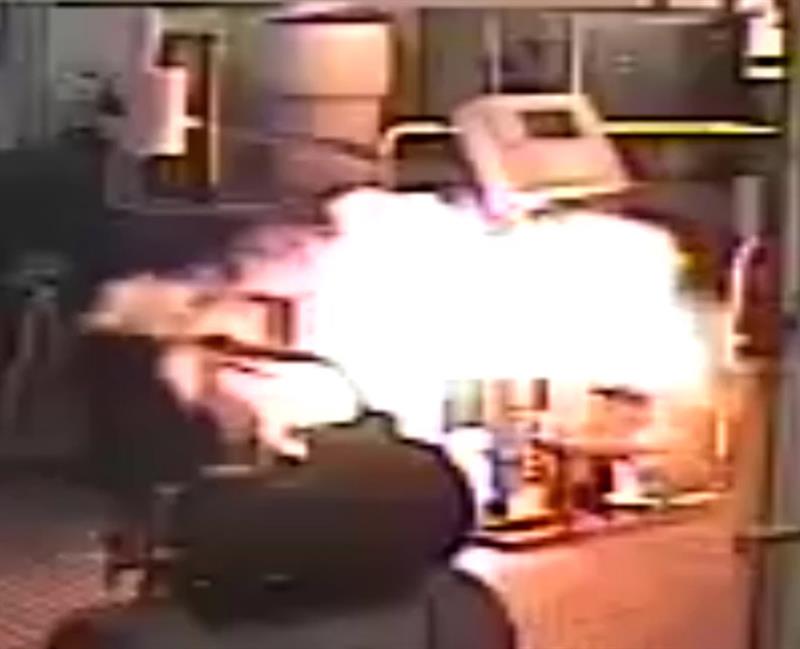Wight Sky was one of three Wight Class sister ferries and following the third engine failure Wightlink withdrew its Wight Class ferries from service. Following discussions between the ferry owner, the Maritime and Coastguard Agency, Lloyd’s Register, and the engine manufacturer Volvo Penta, a mitigation plan was put in place to enable the ferries to return to service.
This investigation found a history of engine failures across the Wight Class fleet dating back to 2010 and consequently, the scope of the investigation expanded to include all known failures.

CCTV image of engine fire courtesy MAIB
This led to a long and detailed technical investigation that comprised forensic examination and testing of five of the failed engines and their components, a full review of the vessels’ system design and operation, and the safety management, planned maintenance and condition monitoring procedures, together with manning and technical oversight. In May 2019, the Marine Accident Investigation Board (MAIB) published an interim report of its initial findings.
The key safety issues identified were:
- Insufficient technical oversight of the engines’ operating parameters.
- Standards of maintenance management and quality control.
- Engine component and auxiliary system design problems.
- A lack of clear ownership for engine maintenance and engine condition monitoring.
In April 2022 a final report was published.
Its synopsis states: “Although Wight Sky’s catastrophic main engine failures had similar consequences, the complex circumstances that led to them differed. However, many of the underlying factors that contributed to the Wight Sky and other Wight Class engine failures were similar and included insufficient technical oversight of engine operating parameters, maintenance management, quality control and engine component and auxiliary system design. This was exacerbated by a lack of engine maintenance and condition monitoring ownership, which resulted in long-standing reliability issues that were either unidentified or unresolved.
“Wightlink and other stakeholders have taken several actions following their internal investigations and in response to recommendations made in previous MAIB reports. Since December 2018, the ferries have successfully operated without any catastrophic engine failures. RK Marine Ltd, the local service centre contracted to undertake most of the Wight Class ferry engine overhauls, has had its authorisation as a Volvo Penta Centre dealer removed by the engine manufacturer.
Recommendations aimed at addressing specific issues that remain unresolved by the actions already taken have been made to Wightlink, Volvo Penta, Lloyd’s Register and RK Marine. These include:
Wightlink: Ensure competent technical oversight of maintenance on board its vessels, through resourced procedures, so that technical issues are identified and escalated to senior management as necessary.
Volvo Penta AB: Identify all affected D16 MH customers to inform and resolve the identified oil filter bypass anomaly.
Lloyds Register: Assess the need to introduce within its rules and regulations the time taken to declutch a main propulsion engine from the drive shaft in the event of an emergency shutdown, to prevent the engine from being driven and increasing the risk of serious injury and damage.
RK Marine: Provide its customers with all manufacturers’ safety bulletins applicable to the engines in use.
Andrew Moll, chief inspector of marine accidents, said: “This has been a long and complex investigation. Initially focusing on two catastrophic engine failures, the investigation found a history of engine failures across Wightlink’s fleet of Wight Class ferries dating back to 2010. Consequently, the scope of the investigation was broadened to include the forensic examination and testing of five failed engines and their components, a full review of the vessels’ propulsion system design and operation. We also examined the ferry operator’s safety management, planned maintenance and condition monitoring procedures, together with the technical oversight provided by the engine manufacturer and its approved service provider.
“MAIB has worked closely with Wightlink, Volvo Penta AB, Lloyds Register and the Maritime and Coastguard Agency over the past three years to help ensure that most of the technical issues identified in the investigation report were addressed as soon as practicable. The report contains recommendations aimed at improving the reliability of the propulsion machinery on board the Wight Class ferries and reduce the likelihood of future catastrophic engine failures."